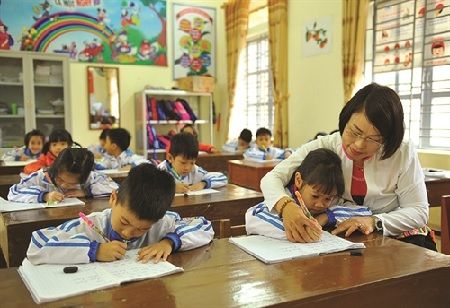- Vietnam needs over 140,000 new classrooms to meet infrastructure standards and implement the 2018 General Education Curriculum effectively.
- Education spending has fallen short, with only 17.6% of the state budget allocated to infrastructure, leading to delays and underdeveloped facilities.
- The Ministry is urging provinces to reorganize school networks, set local infrastructure standards, and support a national education modernization program from 2026 to 2035.
Despite major investments in infrastructure and teaching equipment, Vietnam’s education sector continues to face deep-rooted challenges that hinder the rollout of key reforms, according to a recent report from the Ministry of Education and Training (MoET).
The report highlighted notable progress in upgrading school facilities nationwide. As of now, Vietnam has more than 618,280 classrooms across public preschools and general education levels, with 89.6 percent now classified as permanent structures. Classroom availability at the primary level is largely sufficient to support full-day teaching.
Supporting infrastructure such as libraries, subject-specific classrooms, staff housing, dormitories, kitchens, and sanitation systems have seen increased funding. Private sector participation has also been mobilised through land, tax, and credit incentives, particularly benefiting non-public institutions.
However, MoET pointed out that investment in teaching equipment remains fragmented and poorly coordinated. Many provinces have not yet implemented national standards for specialised facilities. Procurement of essential tools is often delayed due to outdated pricing, limited budgets, complex appraisal procedures, and slow purchasing processes. Some businesses are reluctant to participate in procurement, citing concerns over accountability and legal risks.
Between 2013 and 2024, state budget allocation for education consistently fell below the mandated 20 percent. Of the total, 83.4 percent was spent on recurring expenses, leaving just 17.6 percent for capital investment insufficient for upgrading or building new schools. Some provinces, unable to use their allocations effectively, returned unused funds to the central government.
The sector currently faces a shortfall of 75,380 classrooms needed to reinforce and consolidate existing school infrastructure. An additional 66,799 classrooms are required to meet national class-size regulations. To implement the 2018 General Education Curriculum, schools also need over a thousand specialised classrooms, libraries, teacher accommodations, and sets of essential teaching equipment.
For boarding and semi-boarding students, especially in remote areas, the report cited a need for more than 39,000 dormitory rooms, 2,000 kitchens, and other facilities such as toilets, water systems, and student management spaces.
In response, MoET is urging provinces to restructure school networks based on local needs and avoid inefficient mergers or staff cuts. Land planning should prioritise education infrastructure, particularly in urban and resettlement zones.
Provinces are expected to establish clear standards for classroom space and teaching tools, adapting them to local conditions where necessary. MoET recommended that procurement align with the phased rollout of the 2018 curriculum. Authorities are advised to review existing equipment inventories to prevent duplication and prioritise meeting basic teaching needs.
Also Read: Vietnam's Top Economics University Declares English Its Official Second Language
Director of MoET’s Planning and Finance Department, Trần Thanh Đạm, said the ministry is finalising a national education modernisation programme for 2026–2035 and a proposal to expand boarding school infrastructure in remote areas by 2030. Both proposals are scheduled to be presented to the National Assembly in October.
Local governments will be responsible for overseeing infrastructure and equipment investments, while MoET will coordinate with other ministries to monitor progress and ensure alignment with national education goals.
The ministry has also called for increased local budget allocations and better integration of education development into national target programmes. Mobilising private and community support remains a key strategy for addressing funding shortfalls and meeting urgent infrastructure needs.

